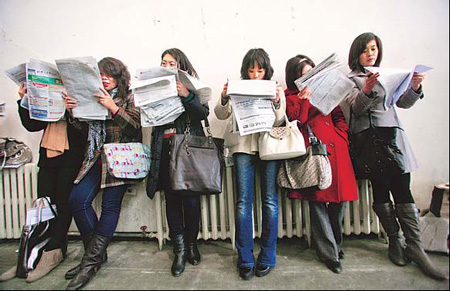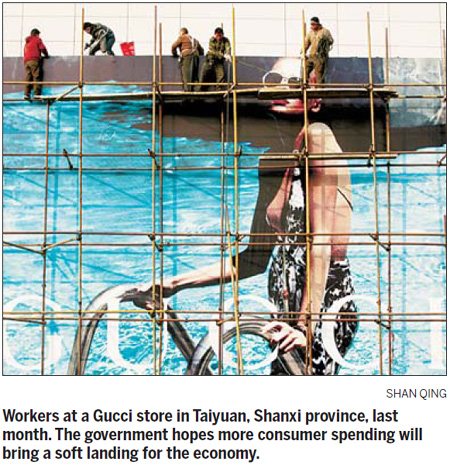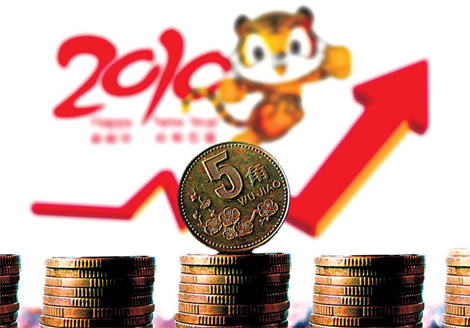BizChina
- Details
- By Mengxin
- Hits: 1239
Scottish money managers' moves reflect shift in economic power
EDINBURGH: When Google Inc, owner of the most popular Internet search engine, said on Jan 12 it may close its website in China, Edinburgh money manager James Anderson sold the stock and bought Beijing-based rival Baidu Inc.
Since then, Baidu has risen 34 percent and Google has lost 8.5 percent. That kind of call helped propel Anderson's closed-end fund, Baillie Gifford & Co's 1.87 billion-pound ($2.8 billion) Scottish Mortgage Trust Plc, to the best performance among its UK peers over the past year.

A janitor cleans a metro station platform next to a Baidu.com Inc advertisement in Shanghai. Baidu shares have risen 34% since rival Google said on Jan 12 it may shut down its business in China.
"Google was admitting they had lost in China," said Anderson, who is Baillie Gifford's chief investment officer and responsible for 56 billion pounds in total. "It was revealing and added to the imputed value of Baidu."
Read more: Selling Google, buying Baidu helps fund beat competitors
- Details
- By Mengxin
- Hits: 1176

Job applicants flip through newspapers searching for employment information at a job fair held at the National Agriculture Exhibition Hall in Beijing late last month.
As nation battles to reduce unemployment, analysts say it is shortage of skilled workers, not jobs, that is causing problems. Daniel Chinoy and Wang Xiaotian report from Beijing.
Song Yongliang did everything right. He worked hard, went to college and majored in Russian, which he thought would be practical in his hometown in Northeast China.
In his senior year, he found an internship as a translator and hoped to find a job with a trading company near the Russian border after he graduated in 2008. Then the financial crisis hit.
- Details
- By Mengxin
- Hits: 1101


Analysts say trip reflects importance of China market
BEIJING: Toyota Motor President Akio Toyoda on Monday apologized to Chinese consumers - who make up the world's biggest auto market - over the company's massive global recall.
"The incident had caused worries to Chinese consumers," Toyoda told a packed news conference. "I hereby express my sincere apologies for these worries."
Analysts said the apology to Chinese consumers is significant as it acknowledges the importance of the Chinese market that has become increasingly key to automakers as they struggle with weak global sales. Last year, China overtook the United States as the biggest auto market.
"The China market is very important to Toyota, so I decided to fly here directly from the US in person to deliver my expression of apology and explanation to Chinese consumers in the hope of regaining trust here," said Toyoda, president and CEO of the world's second-largest automaker, and the grandson of the company's founder.
Read more: Toyota chief says 'sorry' in damage-control visit
- Details
- By Mengxin
- Hits: 924

Central government also faces a dilemma in deciding on its interest rate policies.
As inflation rises - it was 1.9 percent in December and 1.5 percent in January - the market has expected an interest rate hike to come sooner or later.
While the real interest rate risks falling into negative territory due to rising inflation, any hasty adjustment of it could hurt enterprises, especially job-creating private companies, and could even shake the newly recovered economy. It could also stoke inflows of speculative capital from overseas.
"While we expect the central bank to deliver 81 base points of rate hikes this year to avoid real rates turning negative, we do not expect aggressive credit tightening to last long," said Nomura Securities economist Sun Mingchun in a recent report.
Most economists forecast that inflation could reach 3 percent in February, when consumption was active thanks to the traditional Spring Festival, which started Feb 14. And they said there was a possibility of inflation rising further in the coming months, partly due to the relatively low base a year ago.
- Details
- By Mengxin
- Hits: 1020


China's stimulus measures were more akin to a blunderbuss than a sniper's bullet. As economist Stephen Green said, "Everything that could be done was done."
But now, there are increasing signs that the country wants to target its policies more precisely.
Following two hikes in the reserve requirement ratio of commercial banks - the proportion of money they must keep aside as reserves - it is widely believed that a new bout of policy tightening has begun.
The hikes came after the authorities imposed a series of real estate-targeted policies late last year, sending an unequivocal signal that the rapid rise in home prices is intolerable, analysts said. Interest rate hikes could also be in the pipeline if inflation continues to pick up.
More Articles …
Page 65 of 120